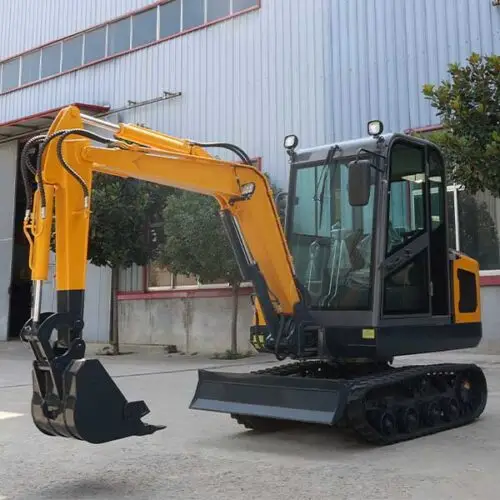Email: [email protected] Whatsapp: 8618266768780
Small Excavator vs. Large Models: Which is Better?

Welcome to My Blog!
Before we dive into the content, I’d love for you to join me on my social media platforms where I share more insights, engage with the community, and post updates. Here’s how you can connect with me:
Facebook: https://www.facebook.com/profile.php?id=100072217509763
LinkedIn: https://www.linkedin.com/company/74949059/admin/dashboard/
YouTube:www.youtube.com/@tractormanufacturer-lc5qz,www.youtube.com/@excavatormanufacturers-sn9hk
TikTok: www.tiktok.com/@tractormanufacturer, www.tiktok.com/@excavatormanufacturers
Now, let’s get started on our journey together. I hope you find the content here insightful, engaging, and valuable.
Table of Contents
Introduction


Excavators are essential machines for various construction, landscaping, and mining tasks, but choosing the right model for your needs can be challenging. Both small excavators and larger models offer unique advantages, but the decision of which is better depends on your specific requirements. This article will compare small excavators with larger models by looking at factors such as maneuverability, cost-effectiveness, power, and versatility. Whether you’re a small business owner or a large-scale contractor, understanding these factors will help you make an informed decision.
NO 1. Maneuverability and Accessibility
When it comes to navigating tight spaces, small excavators are the clear winner. Their compact size and lightweight design allow them to operate in confined areas that larger excavators would struggle to access. For jobs in urban environments, residential construction, or other settings where space is limited, a small excavator is the ideal choice.
On the other hand, larger models, while offering more power and capacity, are less suited for projects that require frequent maneuvering in tight or congested spaces. Their size can make them cumbersome and harder to navigate, potentially slowing down project timelines.
NO 2. Cost-Effectiveness and Operating Costs
Small excavators often have a lower upfront cost compared to their larger counterparts. They require less fuel and maintenance, making them more cost-effective for small-scale projects. This is particularly beneficial for contractors who need to keep operating costs low and avoid over-investing in machinery for tasks that don’t require heavy lifting.
Larger excavators, while offering increased power and load capacity, also come with higher initial costs and increased maintenance requirements. Their fuel consumption is significantly higher, and they may incur additional costs related to storage, transport, and insurance.
NO 3. Power and Efficiency

Large excavators are designed for heavy-duty tasks such as digging, lifting, and moving large amounts of material. Their sheer power and larger buckets make them ideal for demanding projects like deep excavation or large-scale construction work. However, this power comes at the cost of efficiency for smaller tasks.
Small excavators, although not as powerful, are highly efficient for lighter work. They are well-suited for digging, trenching, and grading in residential areas or smaller commercial projects. Their ability to work efficiently without consuming excessive fuel or resources makes them a practical choice for those with lighter demands.
NO 4. Versatility in Tasks
Small excavators offer versatility in many applications, from landscaping to small construction tasks. With various attachments, such as augers, hydraulic breakers, and trenching buckets, small models can easily handle multiple types of projects. Their ability to work in smaller spaces allows them to take on jobs that larger models cannot.
Larger excavators, while versatile in terms of power, tend to be more specialized and are typically used for heavy-duty tasks that require maximum lifting and digging capabilities. They are less versatile in smaller-scale operations where maneuverability and light work are crucial.
NO 5. Ease of Transport and Storage


One of the advantages of small excavators is that they are easy to transport. Their smaller size means they can be loaded onto trailers and transported to job sites without requiring specialized equipment. This can save time and money, especially for contractors who need to move machinery frequently.
In contrast, large excavators require specialized transport vehicles, which can add to the logistical complexities of moving the machine from one site to another. Additionally, they often require larger storage areas and can be more difficult to maintain when not in use due to their size.
Comparison Table: Small Excavator vs. Large Models
| Feature | Small Excavator | Large Excavator |
|---|---|---|
| Maneuverability | Ideal for tight spaces, easy to navigate | Less maneuverable in confined areas |
| Cost | Lower upfront cost, less operating expenses | Higher initial cost, increased operating costs |
| Power | Less power, suitable for lighter tasks | More power, suitable for heavy-duty tasks |
| Efficiency | Fuel-efficient, good for small projects | Less fuel-efficient, ideal for large projects |
| Versatility | Versatile with various attachments | Specialized for heavy lifting and large projects |
| Transport & Storage | Easy to transport and store | Requires specialized transport and storage space |
Conclusion
The decision between a small excavator and a larger model ultimately depends on the scope of your project. If you are working on smaller jobs that require maneuverability and cost efficiency, a small excavator is the better option. It is versatile, easier to operate, and more affordable for light to medium tasks. However, for large-scale excavation work, heavy lifting, and deep digging, a larger model may be the more practical choice.
FAQ
Q1: Can a small excavator handle heavy-duty tasks?
A1: Small excavators are designed for light to medium tasks. While they are efficient and versatile, they are not suitable for heavy-duty excavation work that requires extreme power or large capacity.
Q2: How much more expensive is a large excavator compared to a small one?
A2: Large excavators typically cost significantly more than small excavators. The difference in price can range from tens of thousands to hundreds of thousands of dollars, depending on the model and features.
Q3: Can small excavators be used for residential projects?
A3: Yes, small excavators are ideal for residential projects due to their compact size and ability to navigate narrow spaces. They are perfect for landscaping, trenching, and small-scale excavation.
Q4: What is the fuel efficiency difference between small and large excavators?
A4: Small excavators consume less fuel than large models, making them more cost-effective for lighter tasks. Large excavators, with their larger engines and greater power, tend to have higher fuel consumption.
Q5: Are small excavators suitable for construction sites?
A5: Yes, small excavators are well-suited for smaller construction sites where maneuverability and efficiency are important. For larger construction projects that require heavy lifting, larger models are more appropriate.
About Us
Shandong Qilu Industrial Co., Ltd. is a professional manufacturer and exporter integrating the development and production of excavators, loaders and tractors. We provide the best service, absolutely.
Recent Posts
Video demo
-1.png)
Contact Us Today!
Any question, quote or inquiry? Click the button to send message.
Qilu Industrial will always here to help.
